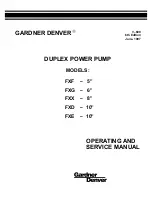
21
9. Do not use the charger on a flammable substrate (eg paper, cloth) or near flammable substances. Due to
the charging of the charger in the charging process, there is a risk of fire.
10. Check the condition of the charger, the cable, and the plug before each use. In the event of faults,
do not use the charger. Do not attempt to disassemble the charger. All repairs should be assigned to an
authorized repairer. Incorrect installation of the charger may result in electric shock or fire.
11. When the charger is not in use, it must be disconnected from the mains.
19. It is forbidden to repair a damaged charger. Carrying out the repair of the charger is only permitted by
the manufacturer or an authorized workshop.
Protect the charger from the environmental impact.
1. Protect the charger from moisture and rain. Moisture and rain can cause dangerous damage.
2. Do not use a charger or battery near flammable vapors and liquids.
3. Use the charger only in dry places and at an ambient temperature of 0-45 C. ֯
4. Do not store the charger in places where the temperature may reach over 30 ° C. ֯ In particular,
do not leave the charger in a car parked in the sun.
Storage of the charger. Terms of use.
Store the charger only in a dry place and at an ambient temperature of 10-30 ° C. ֯ Protect the charger
from moisture and direct sunlight. When operating, use the charger only in a dry place and at an ambient
temperature of 0-45 C. ֯
Protection of the environment.
1. In order to protect the environment, the power tool and packaging must undergo an appropriate
treatment for the re-use of the raw materials contained therein. Do not dispose of power tools in household
waste! According to the European Union Directive 2012/19 / EC on end-of-life electrical and electronic
devices and the validation and as a national law, power tools that can no longer be used must be
separately collected and subjected to appropriate processing for the recovery of the contents making them
valuable raw materials.
2. Rechargeable battery.
Lithium-ion battery (Li-ion).
Do not dispose of batteries in household waste or in water tanks! Do not burn them! Batteries should be
collected, recycled or disposed of in an environmentally friendly way. According to Directive 2006/66 / EC,
spent rechargeable or standard batteries must be recycled.
Summary of Contents for 030150
Page 94: ...94 www raider bg EXPLODED VIEW RD RW01 ...
Page 95: ...95 SPARE PARTS RD RW01 ...
Page 109: ...109 ...
Page 114: ...114 www raider bg ...
Page 117: ...117 ...
















































